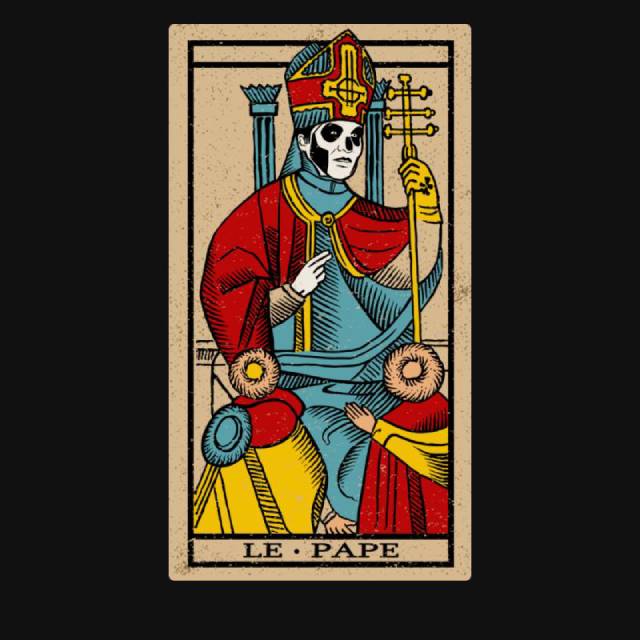The Le Pape Tarot card, often referred to as The Hierophant in traditional tarot decks, offers a profound interpretation from a Christian perspective. This card symbolizes structure, tradition, and the transmission of divine wisdom. In delving into its meaning, one must consider various dimensions—historic, spiritual, ethical, and practical. Understanding the significance of this card within the Christian worldview can provide enlightening insights for both practitioners of the tarot and seekers of spiritual knowledge.
Historically, the concept of a high priest or spiritual guide is deeply rooted in various cultures, including Christianity. The Le Pape card often depicts a figure resembling a pope or high priest, seated with authority, flanked by two acolytes or supplicants. This imagery resonates with the idea of a mediator between the divine and humanity. Similar to how the Old Testament priests served as conduits for God’s will, the Le Pape embodies the role of a facilitator of spiritual teachings, echoing the mission of Christ as the ultimate mediator.
In Christian understanding, the Le Pape card elucidates the necessity of sacraments, rites, and communal worship. It emphasizes the significance of established traditions within the church. Just as Jesus proclaimed the importance of the Law and the Prophets, so too does the Le Pape teach that adhering to spiritual frameworks aids believers in navigating their existential journey. Rituals and traditions serve not only as means of connection to the divine but also as instruments for ethical guidance, moral grounding, and societal cohesion.
From a spiritual lens, The Le Pape card can be interpreted as a call to deeper wisdom and spiritual understanding. Within Christianity, there exists an ever-present quest for revelation and enlightenment. This quest encourages individuals to seek a personal relationship with God while also remaining engaged with the broader Christian community. The card invites individuals to explore the teachings of Jesus Christ and the written word of the Bible, suggesting that true enlightenment arises when personal insight is harmonized with collective wisdom.
The Le Pape symbolically stresses the importance of learning through established doctrines and scripture. This aligns with the Christian teaching of discipleship, which calls on believers to learn from seasoned mentors and glossaries of faith. Hence, the card suggests a hierarchy of spiritual understanding, where those with more experience offer guidance to novices. It serves as a reminder of the collective journey towards spiritual maturity, encouraging individuals to embrace mentorship and communal learning.
Ethically, the role of The Le Pape prompts reflection on institutional authority versus personal discernment. The card can evoke a sense of ambivalence regarding unquestioned adherence to tradition. In a Christian context, it presents a crucial dialogue about the balance of authority and individual faith. Do believers simply accept teachings because they are rooted in tradition, or do they investigate and seek a personal understanding of faith? This inquiry fosters a richer faith experience, one that adheres to Christ’s teachings yet recognizes personal autonomy and responsibility.
Practically, drawing the Le Pape card can serve as a reminder to seek mentorship and participation within a community of faith. It encourages involvement in church activities, bible study groups, and theological discussions. Engaging with others fosters a sense of belonging and encourages spiritual growth. In this way, the Le Pape card signifies a call to community—urging individuals to align themselves with teachings that resonate with their spiritual journey.
Sacred Symbols and Icons
Within the imagery of the Le Pape, various symbols appear, each with specific significances. The triple crown, often seen atop the figure’s head, represents the spiritual authority over heaven and earth. It reflects the notion of a divine connection that transcends earthly limitations. This aspect is particularly compelling when considered within a Christian framework, where believers are called to strive for both personal holiness and communal integrity.
The Role of Faith in Understanding
Furthermore, faith is paramount in interpreting the Le Pape card’s message. In Christianity, faith is not merely a passive acceptance; rather, it requires active participation and willingness to grow. The Le Pape card encourages individuals to commit to this journey, reinforcing the idea that faith is a continuously evolving concept shaped by both personal experiences and collective teachings.
The Diverse Interpretations of Authority
This card also illustrates the varying interpretations of authority within different denominations of Christianity. While some may view the institution as an infallible guide, others might approach it with a sense of skepticism, advocating for a personal relationship with the divine that prioritizes individual interpretation of scripture. This dialogue remains vital in contemporary discourse on faith and spirituality.
The Path of Spiritual Discernment
In summary, the Le Pape tarot card, analyzed through a Christian lens, offers an intricate exploration of tradition, authority, and spirituality. It challenges believers to seek wisdom not only from established norms but also from their personal experiences of faith. This card embodies the interplay between collective religious practices and individual belief systems, encouraging a balanced approach to spirituality—one that honors both tradition and personal insight.
Ultimately, the meaning of the Le Pape card lies in its call to spiritual maturity, ethical discernment, and communal engagement. It serves as a guidepost for believers navigating their faith journey, urging them to seek knowledge from both divine and human sources, thus enriching their spiritual existence.







Leave a Comment